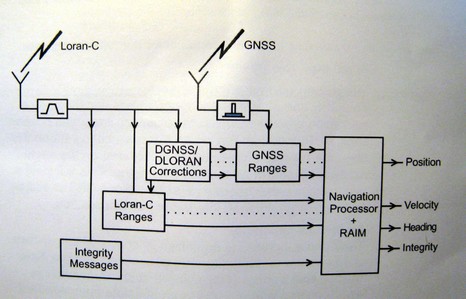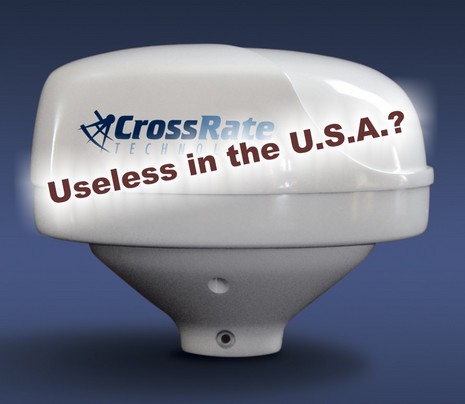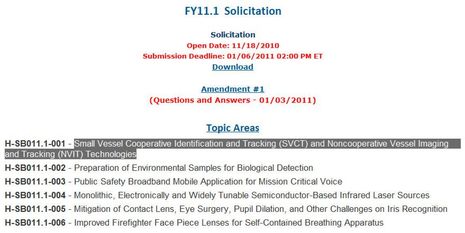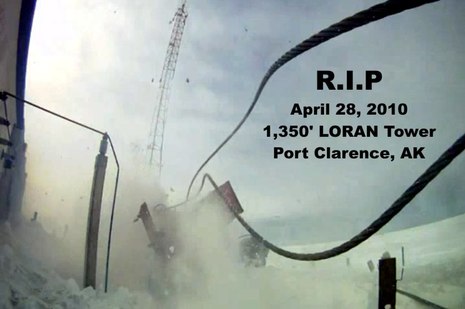eLoran, game on!

Remember all the hand wringing about shutting down the Loran system? Well, the inimitable Langhorne Bond was right again; the USCG’s threat was in fact just smart politics. President Bush’s 2009 budget “migrates” Loran responsibility from the Coast Guard to another Dept. of Homeland Security (DHS) unit called the National Protection and Programs Directorate (NPPD). The budget further states that NPPD will be responsible for finishing the transformation of Loran-C to Enhanced Loran (eLoran). On Feb. 7, DHS announced eLoran will not only back up marine and aviation GPS navigation, but enhance navigation for “first responders” and others operating in difficult GPS environments. This is a big deal.
But I had missed this story until a young (relatively) gentleman named Zachariah Conover sought me out at MIBS. Conover is a founder of CrossRate Technology, which has developed a serious looking Integrated GPS/Loran Receiver that’s just about ready to go. And how about this good fortune: Conover grew up on Isleboro Island (which you’d see left in the Panbo header photo if it were much wider angle), and his company is near Portland. In other words, it’s going to be easy to see what CrossRate is up to, and learn more (than I have so far) about how eLoran will make electronic navigation “belt and suspenders” reliable.
PS The issue of continued USCG HF weather broadcasts was also favorably resolved just recently. Wouldn’t it be a glorious trifecta if the FCC does right next week!













Fine and good, but will my 1981 Sitex 737 still operate on the new system? It operates just fine as a backup right now.
I asked Zach about this and he said that while eLoran is backward compatible with Loran C sets there may be a slight offset in saved positions as they change the way the master stations are controlled so the eLoran sets can use multiple chains at once.
In fact, the CG is testing the new control system on the 9960 chain (Northeast US) right now and have a warning out that includes, “USERS MAY NOTICE A SHIFT IN THEIR MEASURED TIME DIFFERENCES OR REPORTED LAT/LONG AS THE STATIONS TIMING VALUES ARE SET TO THEIR NOMINAL VALUES FOR THE DURATION OF THIS TEST…”
One year later, CrossRate is alive and well and within a months or so of bringing their technology to market. They had a booth at the St. Pete boat show in December and a ME dealer had a CrossRate on display at their booth at the Boston boat show this past week. I have been in contact with John Harrington at CrossRate since 11/08 and the other day, he emailed me stating CrossRate will be out soon with an expected retail price of $1295.00 – I cautioned him that this price seems high (to me) as this product will be an upgrade to most people who already have invested heavily into electronics and at $1295 it may be beyond most people’s interest, as that amount of money buys lots of other things, such as an AIS transponder, which will compliment other electronics on the vessel. Cheers, Ronald aka Seajet
I agree that the price is high, Ronald, but figure that this is sort of a reference model, meant to prove the concept and meant largely for commercial interests. I think Crossrate is also working with one or more large manufacturers of marine GPS, and the results of that collaboration might be more affordable. I’m a bit concerned though about the U.S. Government’s commitment to eLoran, and am trying to find out more.
Loran & 243/121.5 EPIRB’s …
My yacht club invited the USCG to come talk about Rescue 21, DSC, and other safety gear like AIS today. One of the two men was the petty officer from the Eaton’s Neck Coast Guard Station.
They finished by loudly equating Loran with 243/121.5 EPIRB’s … both have been discontinued.
They couldn’t field any questions about Loran other than to say they have no budget to support Loran this year, that parts are too expensive due to the age of the technology, DGPS is more accurate and cost effective.
What about the ease of jamming GPS signals?
I thought that was the main driver behind eLoran.
I did a search for eLoran on the Defender site a few days ago and found that SiTex has a few products with GPS + eLoran. That seemed like progress, before this comment from the USCG.
Jon
But Differential is useless if the GPS system itself is spoofed or jammed:
http://www.crossrate.com/loran-status/gps-vulnerability-articles
Dan, I ran into Zach Conover (see above) at the Maine Boatbuilders Show yesterday, and thus am quite up on the state of eLoran.
The U.S. and several other countries really have decided to use eLoran as a backup to GPS. That’s a fact. But there is a surprising Loran funding cut in the proposed 2010 Federal Budget:
http://www.cnn.com/2009/POLITICS/02/26/budget.cuts/
I think that piddly 190 million dollars (over five years) will be back in the budget before it gets passed in a few months. But we may have to fight for it.
The 2008 FRP (Fedral Radionavigation Plan) has recently been released. It details the federal government’s long range plans for its navigation systems. Apparently the momentum to upgrade the Loran system to provide a backup to GPS has been lost. You can find articles in the trade publications about it. Here’s one: http://www.insidegnss.com/node/1198
You’re likely right that money for eLoran will find its way into the budget. And, I don’t think it’ll be up to seafarers to fight for it. There are a LOT of critical applications that depend on GPS. Ships & boats are way down on the priority list compared to airliners, cellular systems, railroads, etc, etc.
You’re right, Mark. Electronic PNT (Position, Navigation, and Timing) is arguably less important to boaters than many other users. We can lose it all and still just float around (while trying to remember how we used to navigate).
Interesting factoid I heard today: “The U.S. government has already spent over $150 million to upgrade the Loran transmitters to modern solid state transmitters with new backup power supplies and timing systems. This is the majority of the long term asset investment needed to get the Loran system transitioned from LORAN-C to eLoran.”
Absent a concerted effort, including the maretime community, Loran will be defunded under this administration. The air carriers, wireless carriers and others will not defend Loran vibrantly, they have too many oxes being gored at the moment to spend precious political capital on a technology that there aren’t even current generation receivers for.
Given the fact that at least three other global navigation satellite systems are either in existence or in the development phase (European funded Galileo, Russian Glonass, China’s Compass) plus regional systems by the Indians and Japanese, there is little to provide momentum to eLoran.
To take the industry by segement:
Aviation isn’t interested in eLoran because it does not fit their model of GNSS plus augmentation and no administration recognizes eLoran as an alternative to GNSS navigation, nor will they.
Wireless operators are happy with GNSS derived timing and have largely retired their Loran based timing sources. As an example you can now purchase retired GPS disciplined frequency sources for about $250 on the surplus market. The wireless companies are in their second or third generation units and costs have plummeted. The wireless companies aren’t thinking about an alternative, nor are the long-haul transmission companies.
Land based transportation: improvements in GNSS receiver chips have driven the cost to nearly zero and there is no movement to support a second “source” of navigation or timing data, especially since Loran is difficult to receive in the presence of urban noise levels even given its strong signals. GNSS as augmented by wireless signals trumps in urban environments for handsets and will be adopted for the very popular dashboard GPS’s. The availability of cheap silicon produced in billion lot quantities for cell phones will erase any latent desire for a second source in this arena.
I wish the outcome were different, and that industry segments were more long-term focused, but that is not the reality. Further, the fact that Loran isn’t global (there is no Loran in the southern hemisphere at all http://en.wikipedia.org/wiki/File:LoranCoverage.gif) weighs in as well. If Loran survives this budget cycle it will be a sop to supporters but likely that won’t convince suppliers to invest in the technology (only one supplier has produced a Loran/GPS unit even given the previous administrations stated commitment to Loran) and that lack of equipment alone will give credence to budget cutters who will point to the lack of user support for Loran.
Richard D
Interesting, the US drops eLoran, the UK funds it:
“On 31 May 2007, the UK Department for Transport (DfT), via the General Lighthouse Authorities (GLA), awarded a 15 year contract to provide a state-of-the-art enhanced LORAN (eLORAN) service to improve the safety of mariners in the UK and Western Europe. The service contract will operate in two phases, with development work and further focus for European agreement on eLORAN service provision from 2007 through 2010, and full operation of the eLORAN service from 2010 through 2022. The eLORAN transmitter is situated at Anthorn transmitting station Cumbria, UK, and operated by VT Communications, which is part of the VT Group PLC”
Note that the principle of eLoran in Europe is not to replace GNSS, but to provide a reliable fail-safe backup should any or all of the GNSS fail, be it due to local interference, jamming, sunspot activity or solar storms (or, in view of recent events, satellites colliding with each other…)
Two important Senators came out for eLoran, one from the great state of Maine!
http://sidt.gpsworld.com/gpssidt/Latest+News/Senate-Committees-Support-eLoran/ArticleStandard/Article/detail/594454?contextCategoryId=1385
“Obama scraps Loran C”
http://www.mgn.com/news/dailystorydetails.cfm?storyid=9895
US President Barack Obama has announced he is scrapping the LORAN-C programme to achieve a saving of US$35m in a year. A statement says: “This long-range, radio-navigation system has been made obsolete by GPS.”
The decision is consistent with the US Office of Management and Budget February blueprint for the Financial Year 2010 budget. The blueprint says cutting Loran-C would save $36m in 2010 and $190m over five years.
However there is likely to be opposition from the Senate Committee on Commerce, Science and Transportation and the Committee on Homeland Security and Governmental Affairs which in April advocated continued support for the Loran system, working on the basis that eLoran, under development, is the best backup to GPS.
Senator Jay Rockefeller, Chairman of the Committee on Commerce, Science and Transportation, wrote at the the time that his committee recognized the priority in “maintaining Loran-C while transitioning to eLoran” as a means to enhance the homeland security, marine safety and environmental protection missions of the Coast Guard.
“Debate heats up over cancellation of GPS backup system”
http://www.nextgov.com/nextgov/ng_20090511_1364.php
The same day the that the Obama administration confirmed it planned to cancel a GPS backup system, the Government Accountability Office issued a report warning that delays in launching new satellites could imperil the performance of the navigational system.
But at a hearing of the House Committee on Oversight and Government Reform’s National Security Subcommittee, GAO warned that GPS performance could start to degrade next year. Delays in the development and launch of two GPS satellites could reduce the number of satellites in orbit to below the minimum 24 that are needed to provide precise location information, Cristina Chaplain, director of acquisition and sourcing management at GAO, told the panel.
“The estimated long-term probability of maintaining a constellation of at least 24 operational satellites falls below 95 percent during fiscal year 2010 and remains below 95 percent until the end of fiscal year 2014, at times falling below 80 percent,” she said.
If the number of GPS satellites drops below 24, Chaplain said, it “could have wide-ranging impacts on GPS users,” including intercontinental commercial aviation, which “may have to cancel, delay or reroute flights.” Cell phone enhanced 911 emergency services, which rely on GPS to locate callers, “could lose accuracy, particularly when operating in urban canyons or mountainous terrain,” she added.
“Air Force Losing Way with GPS”
http://www.eweek.com/c/a/Application-Development/Air-Force-Losing-Way-With-GPS-445266/
In addition to predicting that a two-year delay in the program could lead to a deterioration of the constellation by 2010, the GAO said the delays in the replacement program might reduce the constellation to 18 satellites before full recovery in 2020.
In an additional analysis, GAO outlined a scenario in which, if the GPS block encounters even just a two-year delay, the probability of maintaining a full service constellation drops precipitously starting in October 2013, possibly going as low as 10 percent by 2018.
The GAO report is available here:
http://www.gao.gov/products/GAO-09-670T
BTW, the F-22 that crashed a month ago was worth $140 million.
“The recently released Independent Assessment Team (IAT) report, chaired by Dr. Bradford Parkinson, the father of GPS, and other industry leaders, concludes ‘… the IAT unanimously recommends that the U.S. Government complete the eLoran upgrade and commit to eLoran as the national backup to GPS for 20 years.’
“The IAT reached this conclusion by evaluating the need for a GPS backup then evaluating all available or potential alternatives. The IAT also performed a “deep dive” on the costs of the Loran system and a transition to eLoran, and found the infrastructure enhancements to eLoran are 70% complete and the cost to complete the rollout is less expensive than decommissioning the Loran system.
“This report is in direct opposition to recent comments made by the Department of Homeland Security that terminating Loran will save $190 M over five years and more research is needed to evaluate the need and solution for a GPS backup.”
— from a release today by CrossRate, http://tinyurl.com/ofalax